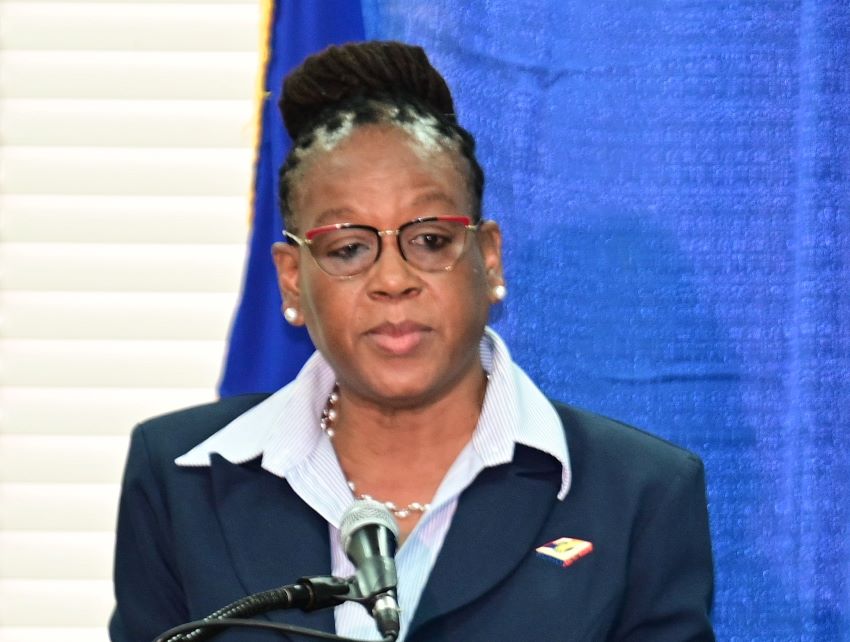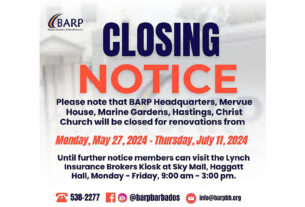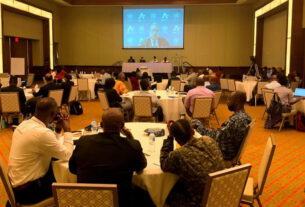BY SHARON AUSTIN | MAY 25, 2022
Talking renewable energy and energy efficiency matters: (From left) Programme Manager at the Ministry of Energy and Business Development’s Project Execution Unit, Keisha Reid; Deputy Permanent Secretary in the Division of Energy, Debra Dowridge; IDB Representative, Viviana del Carmen Alva Hart; Head of Cooperation, EU Delegation to Barbados, Luis Maia; Investment Manager at the Enterprise Growth Fund Ltd., Ferdinand Straughn, and General Manager of FundAccess, Esther Lord-Graham. (C. Pitt/BGIS)
Businesses in Barbados are being encouraged to become “energy champions”.
This encouragement came from Programme Manager at the Ministry of Energy and Business Development’s Project Execution Unit, Keisha Reid, who said everyone has a role to play in the energy transition to cleaner energy, if Barbados is to reduce its dependency on imported fossil fuels.
Ms. Reid said: “We at the Ministry encourage not only homeowners but also businesses to become Energy Champions. No matter the type of business or organisation – from hotels to rum shops; manufacturing plants to poultry farmers; non-governmental organisations and even churches – can be green stewards.
“There are many ways in which a business can be smart in their use of energy. It starts with knowing how your business uses energy and how it can improve its energy use…. A clean energy future will bring economic, environmental, and social benefits to the entire country. Let us all become energy champions.’”
And, the Programme Manager said that as a first step, businesses should perform an energy audit to see their position with respect to their energy use. She made the comments at a press event to launch the recapitalisation of the Energy Smart Fund, on Tuesday, at the Lloyd Erskine Sandiford Centre.
Ms. Reid said evidence showed that people who worked in energy efficient environments were often more productive because workspaces were more employee-friendly and comfortable.
She pointed out that this phase of the Sustainable Energy Investment Programme seeks to build on the successes of the first programme, by injecting much needed low-cost financing into the Energy Smart Fund.
“The Ministry believes that a fundamentally new approach to energy financing is paramount if establishing the next generation of sustainable energy infrastructure is to be attained. As such, expanded financing and more innovative solutions to financing renewable energy and energy efficient technologies is critical for all businesses,” she argued.
Investment Manager at the Enterprise Growth Fund Ltd. (EGFL), Ferdinand Straughn, explained that the Energy Smart Fund II (ESF) has a loan facility of $23.6 million, and will provide financing to businesses for renewable energy and energy efficiency projects at a variable interest rate of 3.75 per cent, up to a maximum loan term of 10 years.
“Loans can now be obtained for electric mobility projects to establish or expand electric mobility fleets. This dovetails with the growing electrification of the transport sector and can have a significant impact on improving the environment. The maximum any one applicant can access is $2 million in loan financing.

“The technical assistance facility of ESF II will be capitalised with $1.6 million and will provide grants to applicants to conduct energy efficiency audits and renewable energy studies…. Under ESF II, grants can now be used to finance pilot studies,” Mr. Straughn said.
He pointed out that pilot studies could involve lighting and AC retrofits; electric mobility projects, inclusive of electric bikes, motorcycles and golf carts; installation of power monitors to conserve energy, and renewable energy projects including solar photovoltaic and solar hot water systems.
The Investment Manager noted that the third component of ESF II was the Air Conditioner (A/C) Rebate Trade-In Facility. “It will provide a 50 per cent rebate to businesses and households for the purchase of new, efficient and ozone depleting substance-free air conditioners, provided an old unit is disposed for each new unit supported. This facility will be rolled-out with selected retailers. The total size of the A/C Rebate Trade-In Facility is $1,000,000,” he indicated.
While EGFL will administer loans greater than BBD$50,000 and up to BBD$2 million, FundAccess will manage funds dedicated to facilitating loans to small and micro businesses.
General Manager of FundAccess, Esther Lord-Graham, said she expects the majority of the applications to be for solar panels and energy efficient lighting, as well as cooling, energy management and mobility products.
“The collaboration thus ensures that micro and small entrepreneurs can play a tangible and practical role in the move towards a more sustainable energy sector,” she stressed.
Mrs. Lord-Graham stated that FundAccess would provide low cost financing to the recipients of the energy fund, and clients would benefit from extended moratoriums, business-related training sessions, introduction to the Financial Literacy Bureau’s training sessions, the first paid year of membership in the Barbados National Standards Institution, and access to their business development officers.




